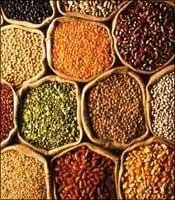 | « Back to article | Print this article |
This Budget, the finance ministry may consider a proposal for a seed fund that would provide financial support to states willing to sell items other than foodgrain, sugar and kerosene through the public distribution system (PDS). The move, experts believe, will help reigning in food inflation that remains in double digits, despite moderation. The food ministry is working on the proposal to include items like pulses and edible oils in PDS.
The food ministry is working on the proposal to include items like pulses and edible oils in PDS.
"A proposal to create a seed fund to meet financial requirement of states which are willing to sell items other than wheat, rice, sugar and kerosene could be announced in the coming budget," said ministry officials.
At present, wheat, rice, sugar and kerosene are supplied through more than five lakh ration shops across the country.
However, with the prices of most essential commodities rising sharply, most states have demanded additional funds from the Centre for distribution of other food items through PDS.
When contacted, minister for food and civil supplies K V Thomas said such a proposal has indeed been discussed at the ministry level and forwarded to the finance ministry for approval.
Sources said the model will be along the lines of what the Kerala government had been doing - the state civil supply department procures and sells pulses, spices and some other items through its network of stores across the state, apart from outlets under PDS.
"Kerala has demanded Rs 332 crore (Rs 3.22 billion) for including more items into the public distribution system, similarly other states have also demanded more funds for procuring and selling food products other than wheat, rice and sugar through PDS," said a senior food ministry official, requesting anonymity.
While the Centre is responsible for procurement, storage, transportation and bulk allocation of foodgrain, the responsibility of distributing the same to consumers through ration shops rests with states.
All operational responsibilities, including allocation within the state, identification of families eligible for cheap foodgrain, maintaining and distributing ration cards, supervision and monitoring of the functioning of ration shops are responsibilities of the state governments.